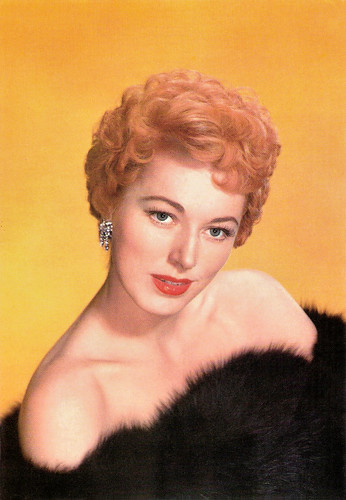
Italian postcard by Rotalfoto, Milano, no. N. 107.

Spanish postcard by JDP, Valencia, no. 1375. Photo: Kirk Douglas and Eleanor Parker in Detective Story (William Wyler, 1951).
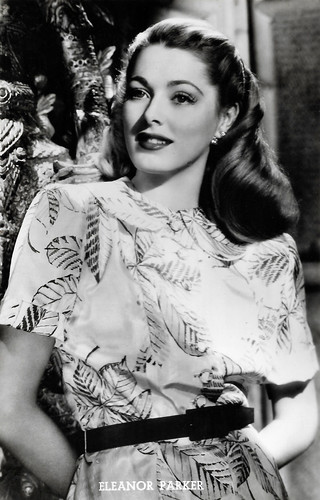
Belgian postcard, no. 551. Photo: Warner Bros.
Mission to Moscow
Eleanor Jean Parker was born in 1922, in Cedarville, Ohio. She was the daughter of Lola (Isett) and Lester Day Parker. Her family moved to East Cleveland, Ohio, where she attended public schools and graduated from Shaw High School. She appeared in a number of school plays. When she was 15 she started to attend the Rice Summer Theatre on Martha's Vineyard in Massachusetts.
After graduation, she moved to California and began appearing at the Pasadena Playhouse. There she was spotted by a Warners Bros talent scout, Irving Kumin. The studio signed her to a long-term contract in June 1941. She was cast that year in They Died with Their Boots On (Raoul Walsh, 1941), but her scenes were cut. Her actual film debut was as Nurse Ryan in the short Soldiers in White (B. Reeves Eason, 1942). She was given some decent roles in B films, Busses Roar (D. Ross Lederman, 1942) and The Mysterious Doctor (Benjamin Stoloff, 1943) opposite John Loder.
She also had a small role in one of Warner Brothers' biggest productions for the 1943 season, the pro-Soviet Mission to Moscow (Michael Curtiz, 1943) as Emlen Davies, daughter of the U.S. ambassador to the U.S.S.R (Walter Huston). On the set, she met her first husband, Navy Lieutenant Fred L. Losse, but the marriage turned out to be a brief wartime affair. Parker had impressed Warners enough to offer her a strong role in a prestige production, Between Two Worlds (Edward A. Blatt, 1944), playing the suicidal wife of Paul Henreid's character. She played support roles in Crime by Night (William Clemens, 1944) and The Last Ride (D. Ross Lederman, 1944).
Then she got the starring role opposite Dennis Morgan in The Very Thought of You (Delmer Daves, 1944). She was considered enough of a ‘name’ to be given a cameo in Hollywood Canteen (Delmer Daves, 1944). Warners gave her the choice role of Mildred Rogers in a new version of Somerset Maugham's Of Human Bondage (Edmund Goulding, 1946), but previews were not favourable and the film sat on the shelf for two years before being released. She had her big break when she was cast opposite John Garfield in Pride of the Marines (Delmer Daves, 1945). However, two films with Errol Flynn that followed, the romantic comedy Never Say Goodbye (James V. Kern, 1946) and the drama Escape Me Never (Peter Godfrey, 1947), were box office disappointments.
Parker was suspended twice by Warners for refusing parts in films – in Stallion Road (James V. Kern, 1947), where she was replaced by Alexis Smith and Love and Learn (Frederick De Cordova, 1947). She made the comedy Voice of the Turtle (Irving Rapper, 1947) with Ronald Reagan, and the mystery The Woman in White (Peter Godfrey, 1948). She refused to appear in Somewhere in the City (Vincent Sherman, 1950) so Warners suspended her again; Virginia Mayo played the role. Parker then had two years off, during which time she married and had a baby. She turned down a role in The Hasty Heart (Vincent Sherman, 1949) which she wanted to do, but it would have meant going to England and she did not want to leave her baby alone during its first year.
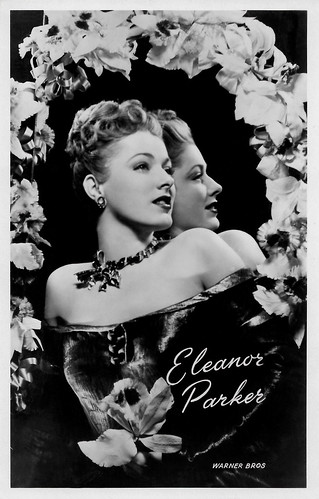
Belgian postcard. Photo: Warner Bros.
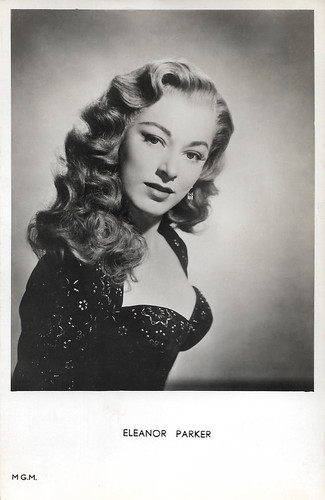
Vintage postcard, no. 92. Photo: M.G.M.
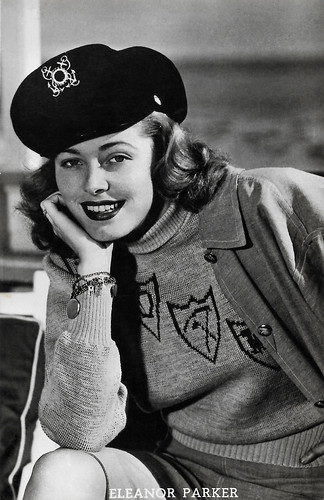
Belgian postcard, no. 950. Photo: Warner Bros.
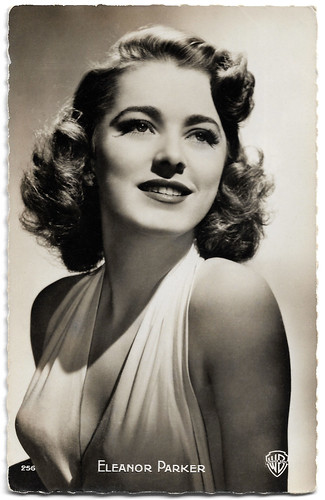
French postcard by Editions P.I., Paris, no. 256. Photo: Warner Bros.
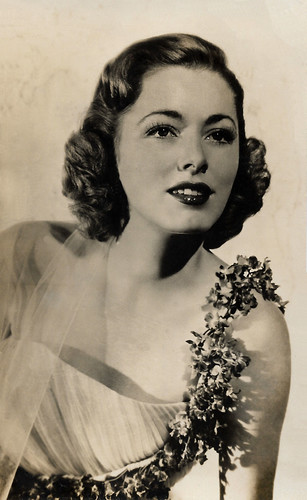
Spanish postcard, no. 2319.
Interrupted Melody
Eleanor Parker returned in Chain Lightning (Stuart Heisler, 1950) with Humphrey Bogart. Parker heard about a women-in-prison film Warners were making, Caged (John Cromwell, 1950), and actively lobbied for the role. She got it, won the 1950 Volpi Cup for Best Actress at the Venice Film Festival and was nominated for an Academy Award. She also had a good role in the melodrama Three Secrets (Robert Wise, 1950).
In February 1950, Parker left Warner Bros. after having been under contract there for eight years. Parker had understood that she would star in a film called Safe Harbor, but Warner Bros. apparently had no intention of making it. Because of this misunderstanding, her agents negotiated her release. Parker's career outside of Warners started badly with Valentino (Lewis Allen, 1951) playing a fictionalised wife of Rudolph Valentino for producer Edward Small. She tried a comedy at 20th Century Fox with Fred MacMurray, A Millionaire for Christy (George Marshall, 1951).
In 1951, Parker signed a contract with Paramount for one film a year, with an option for outside films. This arrangement began brilliantly with Detective Story (William Wyler, 1951) playing Mary McLeod, the woman who doesn't understand the position of her unstable detective husband (Kirk Douglas). Parker was nominated for the Oscar in 1951 for her performance. Parker followed Detective Story with her portrayal of an actress in love with a swashbuckling nobleman (Stewart Granger) in Scaramouche (George Sidney, 1952), a role originally intended for Ava Gardner. Wikipedia: “Parker later claimed that Granger was the only person she didn't get along with during her entire career. However, they had good chemistry and the film was a massive hit.“
MGM cast her into Above and Beyond (Melvin Frank, Norman Panama, 1952), a biopic of Lt. Col. Paul W. Tibbets, Jr. (Robert Taylor), the pilot of the aircraft that dropped the atomic bomb on Hiroshima. It was a solid hit. While Parker was making a third film for MGM, Escape from Fort Bravo (John Sturges, 1953), she signed a five-year contract with the studio. She was named as star of a Sidney Sheldon script, My Most Intimate Friend and of One More Time, from a script by Ruth Gordon and Garson Kanin directed by George Cukor, but neither film was made. Back at Paramount, Parker starred with Charlton Heston as a 1900s mail-order bride in The Naked Jungle (Byron Haskin, 1954), produced by George Pal. Parker returned to MGM where she was reunited with Robert Taylor in an Egyptian adventure film, Valley of the Kings (Robert Pirosh, 1954), and a Western, Many Rivers to Cross (Roy Rowland, 1955).
MGM gave her one of her best roles as opera singer Marjorie Lawrence struck down by polio in Interrupted Melody (Curtis Bernhardt, 1955). This was a big hit and earned Parker a third Oscar nomination; she later said it was her favourite film. Also in 1955, Parker appeared in the film adaptation of the National Book Award-winner The Man with the Golden Arm (Otto Preminger, 1955), released through United Artists. She played Zosh, the supposedly wheelchair-bound wife of heroin-addicted, would-be jazz drummer Frankie Machine (Frank Sinatra). It was a major commercial and critical success. In 1956, she co-starred with Clark Gable in the Western comedy The King and Four Queens (Raoul Walsh, 1956), also for United Artists. It was then back at MGM for two dramas: Lizzie (Hugo Haas, 1957), in the title role, as a woman with a split personality; and The Seventh Sin (Ronald Neame, 1957), a remake of The Painted Veil (Richard Boleslawski, 1934) in the role originated by Greta Garbo and, once again, intended for Ava Gardner. Both films flopped at the box office and, as a result, Parker's plans to produce her own film, L'Eternelle, about French resistance fighters, did not materialise.
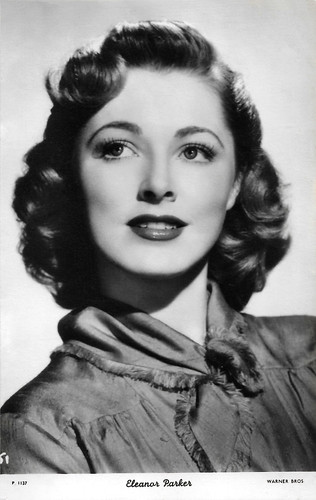
British postcard in "The People' series by Show Parade Picture Service, London, no. P 1137. Photo: Warner Bros.
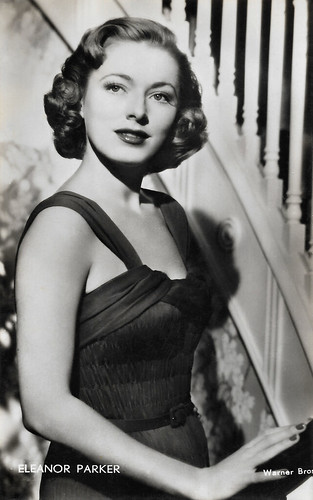
Dutch postcard. Photo: Warner Bros.

Belgian collectors card by Publicité Agence Bell, Brussels, for the Cinéma Montagne in Charleroi, no. 30. Photo: Warners Bros.
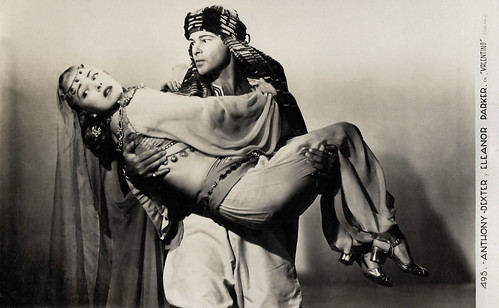
Spanish card, no. 495. Photo: Columbia. Anthony Dexter and Eleanor Parker in Valentino (Lewis Allen, 1951).
The Sound of Music
Eleanor Parker supported Frank Sinatra in a popular comedy, A Hole in the Head (Frank Capra, 1959). She returned to MGM for Home from the Hill (Vincente Minnelli, 1960), co-starring with Robert Mitchum, then took over Lana Turner's role of Constance Rossi in Return to Peyton Place (José Ferrer, 1961), the sequel to the hit 1957 film. That was made by 20th Century Fox who also produced Madison Avenue (H. Bruce Humberstone, 1961) with Parker.
In 1960, she made her TV debut, and in the following years, she worked increasingly in television, with the occasional film role such as Panic Button (George Sherman, Giuliano Carnimeo, 1964) with Maurice Chevalier and Jayne Mansfield. Parker's best-known screen role is Baroness Elsa Schraeder in the Oscar-winning musical The Sound of Music (Robert Wise, 1965). The Baroness was famously and poignantly unsuccessful in keeping the affections of Captain Georg von Trapp (Christopher Plummer) after he falls in love with Maria (Julie Andrews).
In 1966, Parker played an alcoholic widow in the crime drama Warning Shot (Buzz Kulik, 1967), a talent scout who discovers a Hollywood star in The Oscar (Russell Rouse, 1966), and a rich alcoholic in An American Dream (Robert Gist, 1966). However, her film career seemed to go downhill. A Playboy Magazine reviewer derided the cast of The Oscar as "has-beens and never-will-be". From the late 1960s, she focused on television. In 1963, Parker appeared in the medical TV drama about psychiatry The Eleventh Hour in the episode Why Am I Grown So Cold?, for which she was nominated for an Emmy Award. She also appeared in episodes of Breaking Point (1964) and The Man from U.N.C.L.E. (1968). In 1969–1970, Parker starred in the television series Bracken's World, for which she was nominated for a 1970 Golden Globe Award.
Parker also appeared on stage in the role of Margo Channing in 'Applause', the Broadway musical version of the film All About Eve (Joseph L. Mankiewicz, 1950). In 1976, she played Maxine in a revival of 'The Night of the Iguana'. Her last film role was in a Farrah Fawcett bomb, Sunburn (Richard C. Sarafian, 1979). Subsequently, she appeared very infrequently on TV, most recently in Dead on the Money (Mark Cullingham, 1991).
Eleanor Parker was married four times. Her first husband was Fred Losee (1943-1944). Her second marriage to Bert E. Friedlob (1946-1953) produced three children Susan Eleanor Friedlob (1948), Sharon Anne Friedlob (1950), and Richard Parker Friedlob (1952). Her third marriage was to American portrait painter Paul Clemens (1954-1965) and the couple had one child, actor Paul Clemens (1958). Her fourth marriage with Raymond N. Hirsch (1966-2001) ended when Hirsch died of oesophagal cancer. She was the grandmother of actor/director Chasen Parker. Eleanor Parker died in 2013 at a medical facility in Palm Springs, California of complications of pneumonia. She was 91. Parker was raised a Protestant and later converted to Judaism, telling the New York Daily News columnist Kay Gardella in August 1969, "I think we're all Jews at heart ... I wanted to convert for a long time."
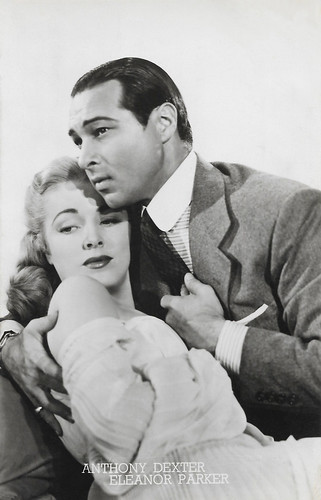
Belgian card, no. 751. Photo: Columbia. Anthony Dexter and Eleanor Parker in Valentino (Lewis Allen, 1951).
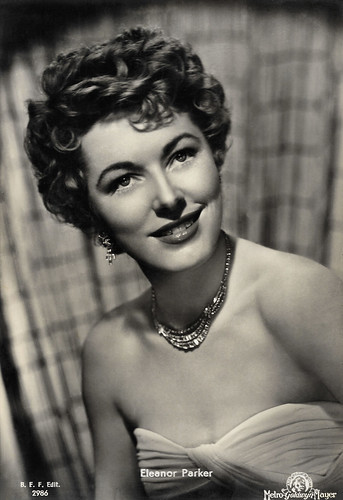
Italian postcard by B.F.F. Editore, no. 2986. Photo: MGM (Metro Goldwyn Mayer).
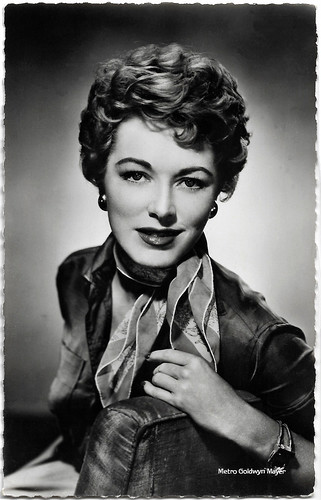
French postcard by Editions du Globe, no 485. Photo: Metro-Goldwyn-Mayer.
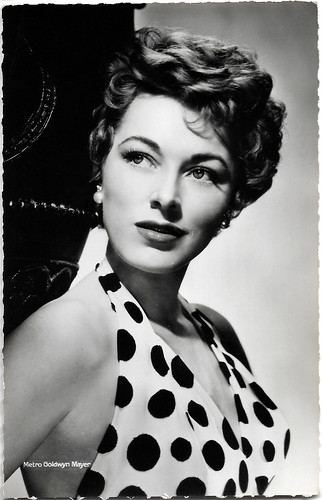
French postcard by Editions du Globe, no 486. Photo: Metro-Goldwyn-Mayer.

Yugoslavian postcard by Sedma Sila. Photo: IOM (Morava Film), Beograd (Belgrade).
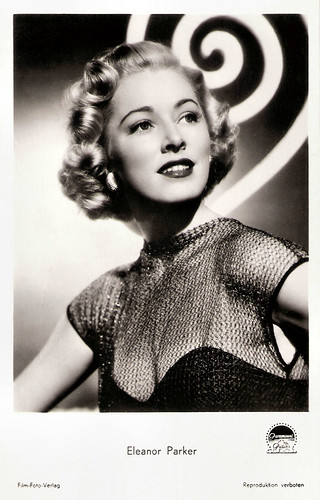
West German postcard by Film-Foto-Verlag, Berlin-Tempelhof, no. FK 258. Photo: Paramount.
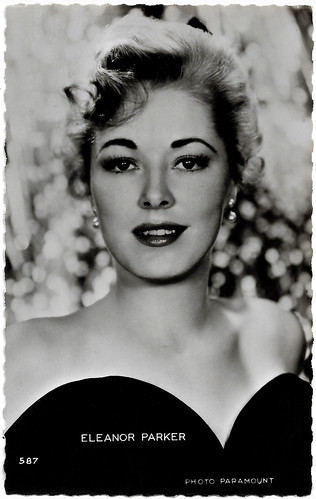
French postcard by Editions P.I., Paris, presented by Les Carbones Korès "Carboplane", no. 587. Photo: Paramount, 1955.
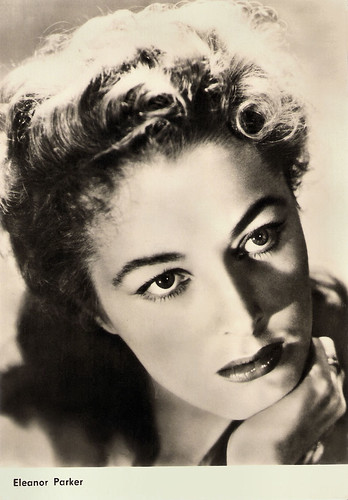
East-German postcard by VEB Progress Film-Vertrieb, Berlin, no. 2679. Eleanor Parker in The Man with the Golden Arm (Otto Preminger, 1955).
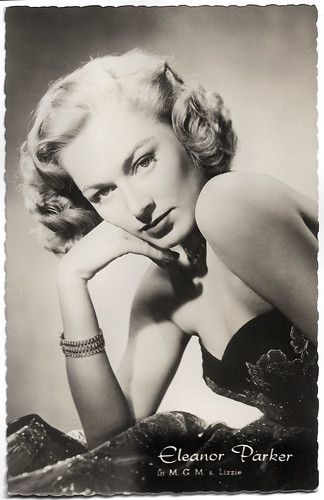
Dutch postcard. Photo: MGM. Eleanor Parker in Lizzie (Hugo Haas, 1957).
Sources: Jon C. Hopwood (IMDb), Wikipedia and IMDb.
No comments:
Post a Comment